The Associated Press says (here),
“After a dozen years in office, one piece of unfinished business remains for Manhattan District Attorney Cyrus Vance Jr. before he retires at the end of the month: Will the prosecutor known for his caution go out with a bang by bringing criminal charges against Donald Trump? Vance, who has spent more than two years investigating the former president, has been coy about whether he’ll seek Trump’s indictment or leave the decision to the next district attorney, Alvin Bragg, a fellow Democrat who takes over Jan. 1.”
Either way, the Manhattan D.A. office’s investigation of Trump’s “business practices” will go on after Vance retires and Bragg (bio here) takes over.
 Of course, it isn’t Vance, but rather a grand jury that decides whether to indict. However, getting indictments is relatively easy, and prosecutors typically can get them for the asking, assuming they have evidence of a crime.
Of course, it isn’t Vance, but rather a grand jury that decides whether to indict. However, getting indictments is relatively easy, and prosecutors typically can get them for the asking, assuming they have evidence of a crime.
In the American system, it’s always ultimately up to a prosecutor whether to pursue charges against someone. That’s a matter of prosecutorial discretion, which in America is very broad.
(Click on image to animate.)
(Note: Grand juries don’t determine guilt or innocence; they only decide whether there’s sufficient evidence to accuse someone of a crime, see details here. That doesn’t require proof beyond a reasonable doubt, only probable cause, a much lower standard of proof. And returning an indictment doesn’t require juror unanimity, but only 12 votes, which for some grand juries is a simple majority. After a grand jury indicts a person under investigation, a prosecutor has to prove the charges in court, where the beyond reasonable doubt standard and requirement for unanimous jury verdict apply.)
Trump, needless to say, would be no ordinary defendant. Any attempt to prosecute him would instantly trigger “political witch hunt” accusation. Millions of Trump supporters will regard it as a plot to keep him off the ballot in 2024. And there are other problems: It may be impossible to find 12 unbiased jurors, and a single Trumper juror could deadlock the jury. But should this keep a wrongdoer from being prosecuted for legitimate reasons? That would put politicians above the law. It’s a conundrum prosecutors have to deal with, and it’s not an easy one.
If Vance, with two weeks left in office, decides to indict Trump he’ll be taking that decision away from the D.A. who has to actually prosecute the case. It really ought to be Bragg’s decision, and my guess is Vance will leave it to him. But that’s not a sure ting. Vance, scion of a prominent political family, may not want to be remembered as the man who didn’t indict Trump. However, Vance isn’t a glory-seeker, he’s a supremely cautious man. That argues for handing over the investigation to his successor and letting him decide what to do with it.
If Trump committed tax crimes or business fraud crimes, he should be prosecuted. This can hardly be characterized as politically motivated, whereas prosecuting him for “political crimes” such as asking the Georgia secretary of state to “find more votes,” or his role in inciting the January 6 insurrection, is much more problematical and far more likely to result in a jury nullification verdict.
Tax fraud is something almost everyone can understand, even if they don’t know it if they see it, and would need it explained to them. (It can be complicated.) And several other recent high-profile trials have shown that jurors will set aside their political leanings and decide guilt or innocence based on the trial evidence. It’s citizenry like that which makes it possible to defy the screeching partisan banshees and pursue justice when political figures break the law.
As for whether Trump is guilty of a crime, this article won’t address that. This would be for a jury to determine, if a prosecutor or grand jury decides to charge him.